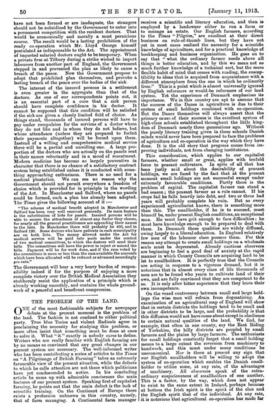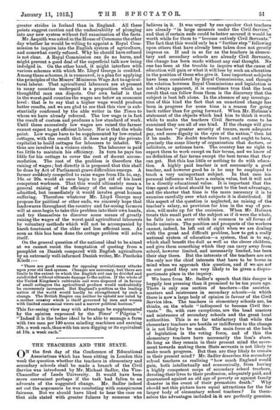THE PROBLEM OF THE LAND O NE of the most fashionable
subjects for newspaper debate at the present moment is the problem of the land. The fashion is not confined to either political party. True blue Tories and violent Radicals agree in proclaiming the necessity for studying this problem, or more often insist that something must be done at once to solve it. What " it " exactly is nobody cares to define. Writers who are really familiar with English farming are by no means so convinced that any great changes in our present system are necessary. The well-informed writer who has been contributing a series of articles to the Times on "A Pilgrimage of British Farming" takes an extremely favourable view of the present situation, while the defects to which he calls attention are not those which politicians have yet condescended to notice. In his concluding article he sums up with admirable conciseness the main features of our present system. Speaking first of capitalist farming, he points out that the main defect is the lack of scientific training. On the Continent of Europe there exists a profession unknown in this country, namely, that of farm managing. A Continental farm manager receives a scientific and literary education, and then is employed by a landowner either to run a farm or to manage an estate. Our English farmers, according to the Times " Pilgrim," are excellent at their direct business on rule-of-thumb lines, but they have not yet in most cases realized the necessity for a scientific knowledge of agriculture, and for a practical knowledge of bookkeeping and business organization. He goes on to say that "what the ordinary farmer needs above all things is better education, and by this we mean not so much further knowledge of a technical sort, but the more flexible habit of mind that comes with raading, the suscep- tibility to ideas that is acquired from acquaintance with a different atmosphere from the one in which he ordinarily lives." This is a point which is almost universally ignored by English reformers or would-be reformers of our land system. Yet the experience of Denmark emphasizes its importance. We in this country are apt to assume that the success of the Danes in agriculture is due to their system of small holdings combined with co-operation. But the Danes themselves will always assert that the primary cause of their success is the excellent system of high-class schools established throughout the little king- dom of Denmark nearly three generations ago. Without the purely literary training given in these schools Danish minds would never have been prepared to face the problems of agriculture and co-operation in the way which they have done. It is the old story that progress comes from im- proving individuals, not from changing institutions.
This consideration, which applies to our capitalist farmers, whether small or great, applies with tenfold force to peasant cultivators. In spite of all that has been justly said about the desirability of peasant holdings, we are faced by the fact that at the present moment small holdings are not successful except under extremely favourable conditions. Partly there is the problem of capital. The capitalist farmer can stand a bad season ; the peasant farmer as a rule cannot. If his crops fail he falls heavily into debt, and two or three bad years will probably complete his ruin. But as every experienced agriculturist knows, there is something more than this. The smallholder, if he is to succeed, must himself be, under present English conditions, an exceptional man. He must have grit enough to face difficulties ; he must have knowledge enough to be prepared to deal with them. In Denmark these qualities are widely diffused, owing largely to a liberal education. In England relatively few men of the labourer class possess them. For this reason any attempt to create small holdings on a wholesale scale must be deprecated. Already cautious observers are beginning to feel a good deal of anxiety at the rapid manner in which County Councils are acquiring land to be let to smallholders. It is perfectly true that the Councils are acting in response to a vigorous demand, but it is notorious that in almost every class of life thousands of men are to be found who yearn to cultivate land of their own, and are fully convinced that they are competent to do so. It is only after bitter experience that they learn their own incompetence.
On the vexed controversy between small and large hold- ings the wise man will refrain from dogmatizing. An examination of an agricultural map of England will show that in certain districts the holdings tend to be small and in other districts to be large, and the probability is that this diffusion would not have come about except in obedience to certain natural qualities of the land. We find, for example, that often in one county, say the East Riding of Yorkshire, the hilly districts are peopled by small farmers and the plains by large farmers. The enthusiasts for small holdings constantly forget that a small holding means to a large extent the reversion from machinery to handwork, and this must under many conditions be uneconomical. Nor is there at present any sign that our English smallholders will be willing to adopt the system of co-operation which enables the Danish small- holder to utilize some, at any rate, of the advantages of machinery. All observers speak of the extra- ordinary suspiciousness of smallholders of one another.
This is a factor, by the way, which does not appear to exist to the same extent in Ireland, perhaps because at bottom the Irish spirit is the spirit of the clan and the English spirit that of the individual. At any rate, it is notorious that agricultural co-operation has made fax greater strides in Ireland than in England. All these points suggest caution and the undesirability of plunging into any new system without full examination of the facts.
Mr. Asquith was asked in the House of Commons the other day whether he would be willing to appoint a Royal Com- mission to inquire into the English system of agriculture, and somewhat curtly refused. Why he should have refused is not clear. A Royal Commission can do no harm, and might prevent a good deal of the superficial talk now being indulged in. On the other hand, it might interfere with various schemes with which Mr. Lloyd George is credited. Among these schemes, it is rumoured, is a plan for applying the principles of the Miners' Minimum Wage Act to agricul- tural labour. That agricultural labourers are at present in many counties underpaid is a proposition which no thoughtful man can dispute. Our own belief is that in the worst-paid counties the wages are below an economic level : that is to say that a higher wage would produce better results, and we are glad to see that this view is sub- stantially confirmed by the able writer in the Times to whom we have already referred. The low wage is in fact the result of custom and produces a low standard of work. Until these excessively low wages are raised the farmer cannot expect to get efficient labour. Nor is that the whole point. Low wages have to be supplemented by low-rented • cottages, with the result that it does not pay the private • capitalist to build cottages for labourers to inhabit. We thus are involved in a vicious circle. The labourer is paid too little to maintain his efficiency. In turn be pays too little for his cottage to cover the cost of decent accom- modation. The root of the problem is therefore the raising of wages ; but directly it is proposed that this shall be done by Act of Parliament grave difficulties emerge. A farmer suddenly compelled to raise wages from 12s. to, say, 16s. or 20s. would at once begin to get rid of his least competent workmen. That this would ultimately mean a. general raising of the efficiency of the nation may be admitted, but immediately it would involve great human suffering. Therefore whatever Mr. Lloyd George may propose for political or other ends, we sincerely hope that landowners throughout the country and far-seeing farmers will at once begin to take this problem into their own hands, and try themselves to discover some means of greatly raising the wages of the worst-paid agricultural labourers by voluntary methods which will not be accompanied by harsh treatment of the older and less efficient men. As soon as this has been done the cottage problem will solve itself.
On the general question of the national ideal to be aimed at we cannot resist the temptation of quoting from a pamphlet on Danish compared with English agriculture by an extremely well-informed Danish writer, Mr. Peschcke ICiiedt :— " There are good reasons for opposing revolutionary attacks upon your old land system. Changes are necessary, but there are limits to the extent to which the English soil can be divided and subdivided without ultimate damage to the nation. If the whole of the United Kingdem's cultivable soil were disposed of in favour of small cottagers the agricultural produce would undoubtedly be enormously increased. But England's position as the leading nation of the world would hardly be strengthened by such a change. The British Empire can neither be upheld nor ruled by a mother couottry which is itself governed by men and women with limited economical views and a narrow political horizon."
This far-seeing view may with advantage be supplemented by the opinion expressed by the Times' " Pilgrim " : "Indeed it is the better ideal to be able to manage a farm with two men per 100 acres minding machines and earning 30s. a week each, than with ten men digging or its equivalent at 10s. a week each."











































 Previous page
Previous page